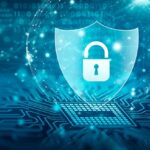In the digital age, cyber threats have become an integral part of the reality faced by all businesses, regardless of size. Small businesses, while flexible and innovative, are often vulnerable to these threats. Limited resources and a lack of cybersecurity expertise make small companies an easy target for hackers. However, implementing the right defenses can significantly reduce risk and increase business resilience. In this article, we’ll share 8 proven ways to help small businesses effectively protect themselves from cyber threats while maintaining data security and customer trust.
1. Install a reliable antivirus program
One of the key steps to small business cybersecurity is installing reliable antivirus software. Modern antivirus programs offer comprehensive protection beyond just blocking viruses. They can detect and eliminate spyware, Trojans, and prevent phishing attacks that can leak sensitive data. It is important that antivirus software is always up to date, so regular updates should be included in your security strategy. In addition, setting up autoruns for new versions of programs and databases will allow you to respond to new threats in a timely manner. This approach significantly reduces the likelihood that your business will fall victim to a cyberattack.
2. MFA
Simple password protection is no longer capable of providing the proper level of security for your online accounts, especially since many users use easy or repeated passwords. Multi-factor authentication (MFA) adds an extra layer of protection by requiring proof of identity through two or more factors. This can be a combination of a password and a one-time code sent to your cell phone, or the use of biometrics such as a fingerprint or facial recognition. Even if an attacker gains access to your password, they won’t be able to access your account without a second element of confirmation, greatly reducing the risk of data theft. Implementing MFA for all your corporate online resources is an effective and simple measure that can protect your business from most attacks.
3 Encrypt important data
Data encryption is a critical security measure that converts information into a code that can only be accessed by those who have the appropriate key to decrypt it. This is especially true for protecting sensitive data such as financial information, personal customer data, and corporate secrets. Even if attackers gain access to encrypted information, it is impossible to decrypt the data without the key, which significantly increases the level of security. Encryption helps to reduce the risks of information leakage and ensure security both during data storage and transmission.
Benefits of data encryption:
- Protecting the confidentiality of financial and personal data.
- Reducing the risk of data leakage and loss in case of hacking.
- Ensure data security in both storage and network transmission.
- Compliance with regulatory requirements and data protection standards.

4. Update software regularly
Regular software updates are one of the most effective ways to protect against cyber threats. Many attacks, including viruses, Trojans and other types of malware, exploit vulnerabilities in older versions of software that have not been updated in a timely manner. Updates not only enhance the functionality of programs by improving performance and adding new features, but also address vulnerabilities that can be exploited by attackers to infiltrate your system. It is important to set up automatic updates for all critical programs, including operating systems, antivirus software, browsers, and other applications, to minimize risks and ensure that you are always protected from new threats.
5. Educate employees on the basics of cybersecurity
Educating employees on the basics of cybersecurity is critical to protecting your business from cyber threats, as they are the first layer of defense. Knowing how to recognize phishing emails, avoid suspicious links and attacks, and how to create and manage complex passwords can significantly reduce the likelihood of successful cyberattacks. It is important to train staff on how to use corporate networks securely, as well as educate them on data protection and security policy compliance. Regular training and reminders of current threats help employees to be prepared for possible attacks and respond quickly to potential risks, which significantly strengthens overall business security.
6. Data Backup
Backing up your data is a necessary measure to keep your business information safe, no matter how well protected it is. Even with strong defenses in place, there is always the risk of data loss due to system failures or cyberattacks such as ransomware, where malware encrypts files and demands a ransom to recover them. By making regular backups, you can quickly recover lost data and minimize losses. It is important that copies are stored in secure locations, such as cloud storage with strong encryption or encrypted external devices, so that if the originals are lost or corrupted, the data remains protected and available for recovery.
Data Backup Best Practices:
- Making regular copies of critical information.
- Store backups in the cloud or on encrypted devices.
- Utilize automated backup solutions.
- Ensure that backups are up-to-date and up-to-date with the current state of the data.
- Store copies of data in several geographically different locations to protect against natural disasters.
7. Use virtual private networks (VPNs)
Using a virtual private network (VPN) is an important security measure for employees working remotely or connecting to the Internet over public Wi-Fi networks that may be vulnerable to cyberattacks. A VPN encrypts Internet traffic, creating a secure and anonymous connection between the user’s device and the corporate network. This keeps data safe from interception, especially when it comes to sensitive information or accessing important corporate resources over open networks. A VPN also helps to conceal the user’s location, providing an additional layer of privacy. Implementing a VPN for all remote employees ensures that even if unsecured networks are used, data remains secure.
Benefits of using a VPN:
- Encrypting Internet traffic to protect data.
- Provide secure connectivity on public and unencrypted networks.
- Increase privacy and anonymity on the Internet.
- Protect access to corporate resources from remote devices.
- Minimize the risk of data interception during data transmission.
8. Vendor and partner security screening
Vendor and partner security screening is an important part of comprehensive data protection for your business. Because vendors and partners may have access to your corporate information as well as internal systems, it’s important to make sure they adhere to strict cybersecurity standards. Before you establish a long-term business relationship with them, you should audit their data protection measures, including their privacy policies, use of encryption, data transmission security and whether they have mechanisms in place to protect against leaks and cyberattacks. This is especially important if they will be handling sensitive information or have access to your internal systems. Understanding your partners’ level of security helps minimize the risks of data breaches and other threats that can occur through third parties.



